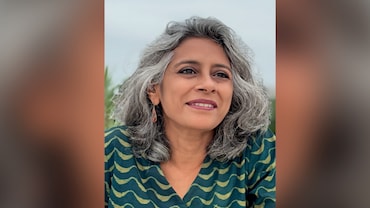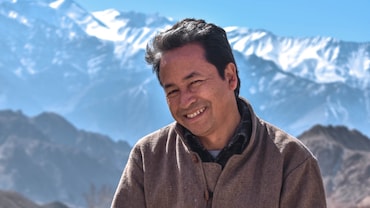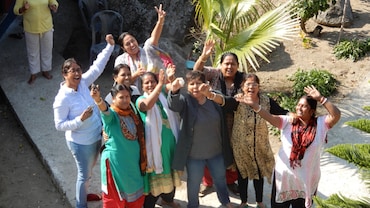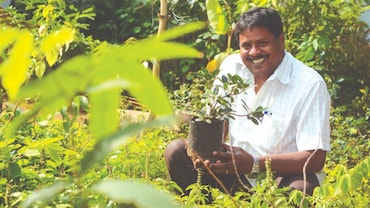- HOME
- /
- Features
- /
- Personalities
- /
'Be Your Best Possible Self'
Actor Ayushmann Khurrana’s brush with spirituality has powered his growth and inspired him and his wife Tahira to fight back a grim diagnosis
 Ayushmann Khurrana began his Bollywood career with the hit Vicky Donor. Photograph By Bandeep Singh.
Ayushmann Khurrana began his Bollywood career with the hit Vicky Donor. Photograph By Bandeep Singh.
Walking the tightrope between being stars and remaining true to their art form does not come easy to Bollywood actors. Ayushmann Khurrana, 34, has emerged as a surprising exception. Khurrana made his debut in 2012 with Vicky Donor, where he played a west Delhi Punjabi boy who falls in love with a Chittaranjan Park Bengali girl. The film portrayed the peculiarities of the two communities tenderly and comically, while exploring the topic of infertility. Khurrana owned the character of Vicky, a sperm donor, and established himself as a reliable actor with excellent comic timing. His recent back-to-back successes—Bareilly Ki Barfi (2017), Shubh Mangal Savdhan (2017), Andhadhun (2018) and finally the Rs 200-crore grosser Badhaai Ho (2018)—have propelled him into Bollywood’s league of stars. It is a commendable achievement when one sees how many ‘non-star kids’ versus ‘star kids’ make it. It is also worth emphasizing how Khurrana has managed to do so through the roles he essays. Unlike his non-star kid contemporary Ranveer Singh—whose biggest hits are larger-than-life movies like Bajirao Mastani and Simmba—Khurrana’s unique selling point is his ability to bring to life ordinary, relatable characters with a touch of comic innocence.
Challenging Times
But the dimpled boy from Chandigarh who has brought a smile to audiences’ faces, has recently had to fight a dark, personal battle. Khurrana’s wife Tahira Kashyap, 36, was diagnosed with breast cancer in mid-2018. Their happy family—with children Varushka and Virajveer—was suddenly up against a towering monster. “We got to know that Tahira had cancer on my birthday, 14 September. We just decided to go for a movie date. There was no point sulking; we knew we had to fight this disease,” says Khurrana as we chat in a conference room in the expansive Yash Raj Film Studios in Mumbai.
 Ayushmann and Tahira with their kids Varushka and Virajveer
Ayushmann and Tahira with their kids Varushka and Virajveer
Kashyap, a film-maker, writer and teacher, underwent a mastectomy and chemotherapy to be declared cancer-free in January this year. “It was all very unreal for me. She’s the one who wanted to just come out with it. Tahira attended lectures and met a lot of cancer patients while she was undergoing chemotherapy. She was also working on the pre-production for her yet-to-be-released short film while her treatment was on. Both of us kept busy and tried not to think about it too much. We took it one step at a time, one day at a time,” says Khurrana. “She never asked ‘why me?’ She was always very positive about it.”
Kashyap, for her part, feels that cancer has changed not only her perspective on life but that of her family’s as well. “You start looking at the bigger picture and realize that so many things that you struggle with in life are so petty. Thanks to my spiritual practice, I looked at it as the steepest learning curve not only in my life but also my family’s,” says Kashyap.
Then Came The Inspiration
She and Khurrana are now followers of Nichiren Buddhism, a branch of Mahayana Buddhism, which has provided the fuel to fight their battles. “I’m in a happier space,” adds Kashyap, “I feel liberated. Cancer changes something within you. It makes you fearless. There are two ways to deal with any obstacle—either you get beaten down by it or you face it head on. Once you decide to face it, you begin to re-evaluate your life. I appreciate and love people even more. I don’t know how to put it—but I just enjoy life now.”
Khurrana has been amazed—and inspired—by his wife’s transformation. “Tahira has a very strong facade. She’s always been a sportsperson, a very strong girl. But faced with this diagnosis and because of her practice, she’s become stronger inside out. It has brought about a sea change in her personality. She was scared of needles and would look away when there was a blood test. And now she gives herself injections,” says Khurrana.
The practice has also allowed Kashyap to answer her true calling. “Ayush and I have similar interests. We did theatre together, but he knew what he wanted and pursued it, while I floundered,” says Kashyap. She ran a public relations agency, an event management company and taught mass communication before making her well-received short film Toffee in 2018. “I was good at all the things I did but my heart wasn’t in it. And I didn’t do what I really wanted to because I was afraid of failing. It’s when my [spiritual] guides made me dig deeper within myself that I realized that I hadn’t admitted to myself that I wanted to be a film-maker,” says Kashyap.
Nichiren Buddhism has also helped Khurrana articulate his journey as an actor better. “I was five years old when I decided I was going to be an actor, but I just didn’t tell anyone about it,” Khurrana reminisces. “Taking part in the arts was encouraged at home,” says Khurrana. “My father plays the flute and is like an encyclopaedia when it comes to Hindi film music. But I grew up in a small city and with very middle-class values and insecurities. I couldn’t be vocal about my Bollywood aspirations.” Khurrana chose instead to secretly inch towards his dream. In college, after clearing his exams to join dental school, he decided to switch to the arts so that he could take part in theatre actively. He travelled the length and breadth of the country with theatre troupes and even founded two groups—Aaghaaz and Manchtantra, all the while excelling in his studies.
In 2004, he won the second season of MTV Roadies, making him a mini-star in his hometown. “That’s when I lost my mind,” jokes Khurrana. “I was just 19 and getting a lot attention from girls around me—something I wasn’t used to. I even broke up with Tahira. But by the time the next season began, everyone had forgotten me. I realized then that being famous is not the same as being successful. That fame is a byproduct of success and not the other way round. I begged Tahira to take me back.”
Kashyap laughs at the memory of their long-ago break-up. “He came to me and said that now that he’s famous he wants space to grow emotionally, socially and physically. Imagine that! As if I was stopping him from growing physically. But in two months he came to his senses,” says Kashyap. “He’s always been a good boy, you know,” she adds.
Childhood Sweethearts
Their love story is truly heart-warming—almost out of an Ayushmann film. The two went to the same tuition classes. “We had a mutual crush but neither of us spoke to the other,” says Kashyap. As the school year came to an end, Kashyap’s parents took her to an acquaintance’s home for dinner. “They told me that their friend was an astrologer—I was thrilled that I would find out about my future. We go for the dinner and, guess what, it’s Ayush’s house! [Ayushmann’s father Acharya P. Khurrana is a renowned astrologer.] It was like a Bollywood movie. After a whole year of not speaking to each other we were finally face-to-face,” says Kashyap. The two got married in 2010.
“He’s a very honest, sincere artist. I could have said sincere human being (that’s true as well) but it’s not the same thing. Ever since I’ve known him, I have only known him to give more than 100 per cent to whatever he does. He never takes his art or work for granted,” adds Kashyap. This is a sentiment Sriram Raghavan, director of Andhadhun, echoes. “He’s an actor first,” says Raghavan. “He’s spontaneous, instinctive and often enjoys improvising on the spot. He has a terrific story sense, which is an absolute asset.”
Though Khurrana has grown as an actor, many of the fundamental qualities that make him a serious artist were there from the start. Shoojit Sircar, director of Vicky Donor, says, “A lot of actors backed out of the film when they came to know that it was about sperm donation.” And then Khurrana came along. “For me, he was Vicky. Apart from being a confident Punjabi boy, I saw in him an innocence that made me cast him.”
“It doesn’t matter to me who I work with. What matters is the script,” explains Khurrana. In an upcoming film directed by Amar Kaushik, who made Stree, Khurrana plays a guy experiencing premature baldness. “The female protagonist is dusky and has an inferiority complex related to that. I, on the other hand, have a complex about losing my hair in the film.” In yet another film titled Dream Girl, Khurrana plays the role of a man who portrays female characters in theatre, mostly that of Sita in Ramlila. “I only want to do movies that break the mould, that are disruptive,” he says.
Khurrana’s discernment in selecting films comes from the clarity he has always had about who he wants to be. “I do cinema only for myself. I do music gigs to make money. If acting was the only thing I did, then I would think twice before turning down a film,” says Khurrana. “Human potential is tremendous, you just don’t realize it. When I was in Chandigarh, I’m sure a lot of people must have thought, ‘Yeh actor nahi ban sakta,’ (he can’t become an actor). But it’s just your potential, you know. You have to have the faith that you can do something and you do it. Nichiren teaches you that if you don’t know what your limit is, there is no limit. You can go beyond it. You should become your best possible self,” says Khurrana.






